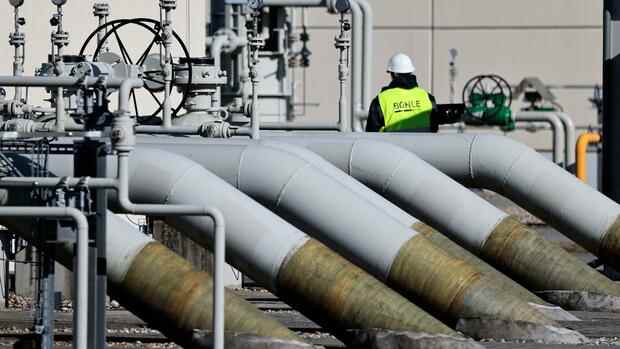The threatened gas boycott is just one of the counter-sanctions that the Kremlin has prepared.
(Photo: Reuters)
Berlin Ukraine is in favor of embargoing or at least restricting the operation of the Nord Stream 1 pipeline in the Baltic Sea. “It would be appropriate to sanction Nord Stream 1 as soon as possible. That would weaken Russia’s war machine,” Sergiy Makogon, head of Ukraine’s state gas network operator GTSOU, told Handelsblatt.
Makogon argues that his company can take on additional volumes. Sanctions for Nord Stream 1 would therefore have “no negative effects” on Germany’s continued gas supply. The GTSOU network is fully intact and has considerable capacity.
In the German governing coalition, Makogon receives support for his arguments. And Jens Spahn, deputy chairman of the Union parliamentary group in the Bundestag, is also in favor of stopping natural gas imports via Nord Stream 1. “Now it’s about: how do we not only become fossil-free, but how do we become Putin-free in our energy supply,” he said.
>> Read here: USA boycotts Russian oil – Germany will not go along with it
Top jobs of the day
Find the best jobs now and
be notified by email.
In Germany, there has been a heated argument for days about whether the existing sanctions against Russia should also be extended to oil and natural gas supplies. The National Academy of Sciences Leopoldina argued last week that Germany could cope with immediately renouncing natural gas and oil from Russia. “Bottlenecks could arise in the coming winter,” says a paper by the Leopoldina scientists. However, there would be an opportunity to limit the negative impact and cushion the social impact by immediately implementing a package of measures.
The Munich Ifo Institute is also in favor of a rapid departure from Russian oil and gas. “Germany should quickly and decisively reduce its dependence on Russian gas. Without appropriate measures today, we run the risk of being blackmailed in the coming winter,” says Karen Pittel, head of the Ifo Center for Energy, Climate and Resources. However, the Ifo researchers concede that stopping imports from Russia could “cost up to three percent of gross domestic product”.
Habeck sees social peace endangered
The federal government and large parts of the economy, however, warn against such a step. Federal Chancellor Olaf Scholz fears massive economic cuts, Federal Minister of Economics Robert Habeck (Greens) also sees social peace at risk. The industry warns of domino effects that are difficult to calculate and severe impairments to production and supply chains.
GTSOU boss Makogon is pointing the way to a compromise with his call for Nord Stream 1 to be sanctioned. “If the German decision-makers cannot agree on such a clear step, Germany could pursue an alternative approach. It could reduce volumes via Nord Stream 1 by at least 25 percent,” Makogon said. “At the same time, Germany and other EU member states should announce that priority will be given to Russian gas imports through GTSOU in the future,” he said.
Makogon argues sanctions on Nord Stream 1 would be a strong incentive for Russia to keep Ukraine’s GTSOU network intact. “In that case, GTSOU could ensure continued gas supplies to the Ukrainian population – at least to the part that is not yet cut off from gas supplies by Russian attacks on Ukraine’s civilian infrastructure,” he said.
If GTSOU becomes the key infrastructure for Russian gas exports to the EU, “Ukraine would also have an additional bargaining chip for future peace negotiations with Russia.”
So far, Russia has fulfilled its delivery obligations
The Russian government itself threatened to cut off supplies via Nord Stream 1 a few days after it began its invasion of Ukraine. Such an embargo would be justified given the “unfounded allegations against Russia regarding the energy crisis in Europe and the ban on Nord Stream 2,” Russian Deputy Prime Minister Alexander Novak said in early March. His government has not yet decided to do so. “But European politicians are pushing us in this direction with their statements and accusations against Russia,” he said.
So far, Russia has fulfilled its contractual obligations to supply gas. Only on Monday did the Russian energy company Gazprom announce that gas transit through Ukraine would continue despite the war. On Monday, 109.5 million cubic meters would be pumped through the pipes, a Gazprom spokesman said, according to the Interfax news agency. The value corresponds to the upper limit of the daily booked transit capacity. GTSOU also recently confirmed that the Russian side is making full use of the transit capacities to which it is entitled.
More: Floating LNG terminals could help ease the situation
